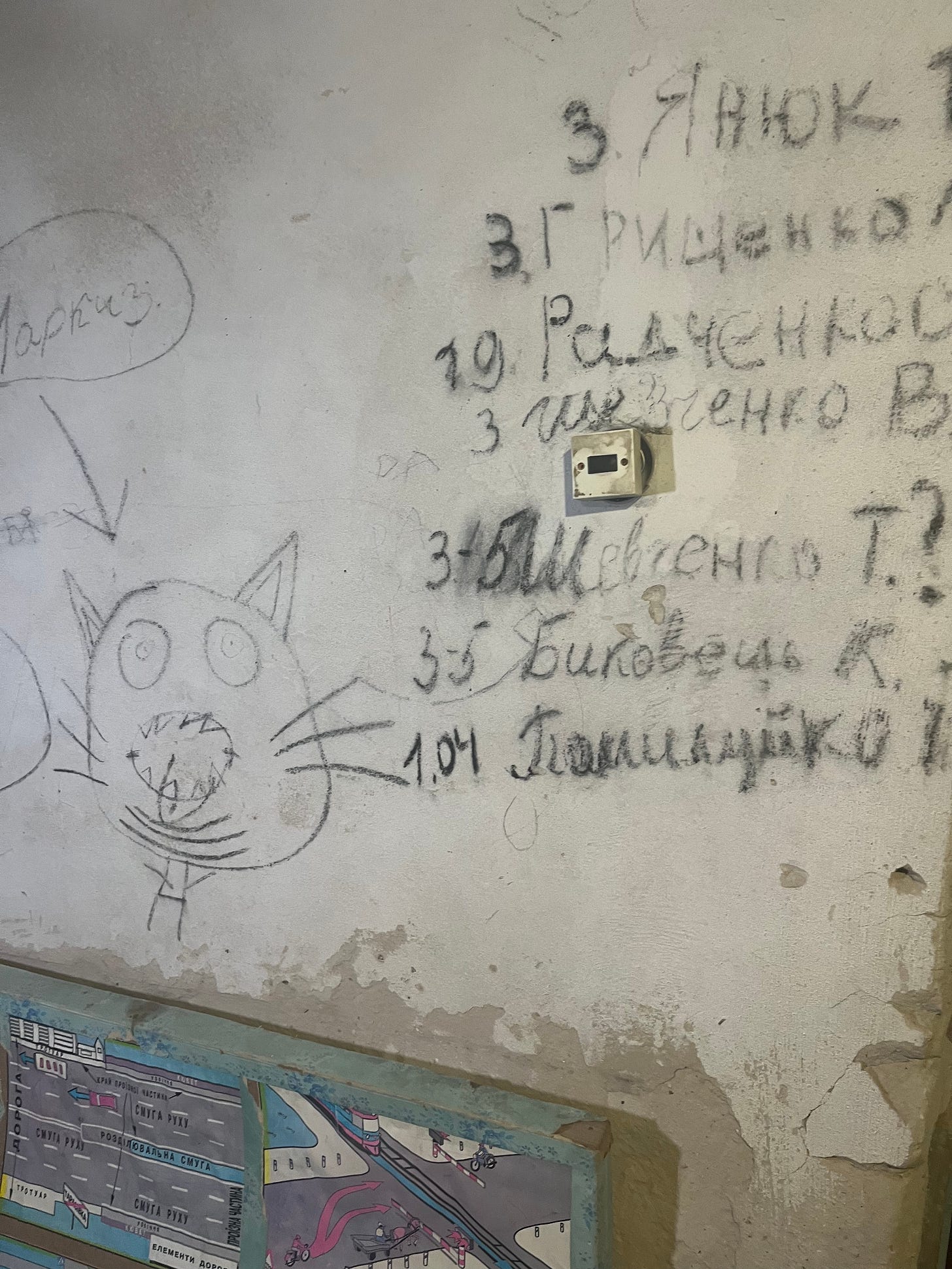Inside the Basement Where Russians Held Over 300 Ukrainians
For 27 days in March 2022, Russians held an entire village hostage.

The following post is based on a trip to Ukraine with a group of German journalists where we spoke with survivors of the occupation of a village in the early days of the full-scale invasion.
YAHIDNE, Ukraine -- The village of Yahidne lies 90 miles north of Kyiv, and 70 miles from the border with Russia, off of the highway going to Belarus. On March 3, 2022, Russians occupied the five streets of the village.
Ivan Petrovich Polhui was the janitor of Yahdine's elementary school. He said, "The [Russians] were entering the houses, destroying phones, shooting cars, and making sure that people could not leave." Many residents were hiding in the basements of their homes, but the Russians forced them out. The Russians rounded up the villagers at gunpoint, including Ivan Petrovich and his sons and their children. Then, the Russians forced some 367 people -- almost the entire community of about 400 -- into the basement of his elementary school.
"CAUTION CHILDREN," is painted on the door going down to the basement. Some 50 children as young as a month and a half old were trapped in the near darkness of the basement for 27 days, cut off from contact with the outside world. They were hostages of the Russian forces who were trying -- and ultimately did not succeed in -- capturing the cities of Chernihiv and Kyiv. 11 people died there, some from disease, and an additional 10 are believed to have been killed by the Russians, according to Ukrainian authorities.
The basement is no more than 200 square meters. It is dark and dank. During the March captivity, it was cold. Going down to the cramped basement on a rainy April day last week and breathing the musty air, I could begin to feel how desperate the conditions must have been.
The basement also got hot because of the crowding and lack of air, with condensation filling the ceiling. While small groups of people were allowed outside for a few minutes to gather food and water or to use a toilet, the villagers mostly had to use buckets inside. There was very little food and water. At one point, Russians split three army rations with the entire room of 367 people. Contagious diseases were widespread, and there was little medicine. Some mothers of small children only had vitamins to give their children as they struggled with chickenpox and fevers. Elderly people began dying. This is a list of people who died.
At the outset, many hoped they would be in the basement for a day or two. People lost their sense of time. Five days in, a kindergarten teacher, Valentyna Danilova, scrawled a calendar.
Olena Shvydka, the head of the Ivanivka Village Council, which includes Yahidne, said, "There were days when people were thinking, 'This is the end.'" She said that one of the worst days was when the Russians forced the young men outside and told them to dig holes. This photo is a list of people who the Russians shot, and many do not have a date because it is not known.
The Russians did not always allow the villagers to bury dead bodies, so some people were forced to sleep next to them. When they did finally allow the corpses to be taken out, Shvydka said that they did not allow people to simply carry them out but had to be passed one by one over people's heads to the exit.
Shvydka's grandmother died on March 8. The Russians didn't allow her to use the village graveyard, and so she was buried in the garden. The next day, the Russians shot her uncle. On March 14, another elderly relative died, so there were three graves in her garden. The Russians shelled her house four times. But the hardest thing was losing her relatives: "The [Russians] understood that the most precious thing that you have are your relatives," she said.
Amid harrowing conditions, Ukrainians resisted. One girl wrote the Ukrainian national anthem on the wall. Shvydka told us that the Russians at one point said that anyone who would recite the Russian national anthem would get to go outside. None of the villagers did.
The Ukrainian Army liberated Yahidne on March 30 -- 27 days after the villagers were forced into the basement. Shvydka remembers seeing many cars shot up with the dead bodies of those who had tried to escape the village. Two years later, a Ukrainian court convicted 15 Russian soldiers in absentia of war crimes in Yahidne.
There is a memorial outside the school commemorating the Ukrainians who spent 27 days in the basement, and those who didn't make it. Lesson books were scattered throughout the basement, but there are no plans for the building to be used as a school ever again.
Photos continue below:





